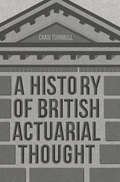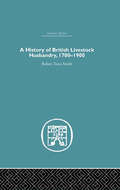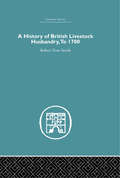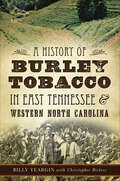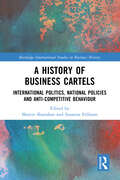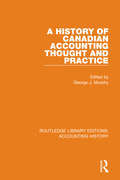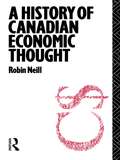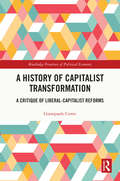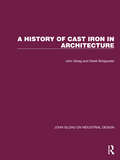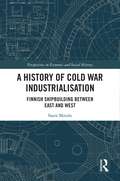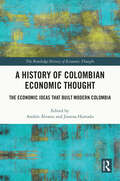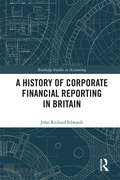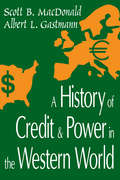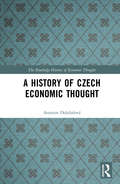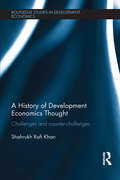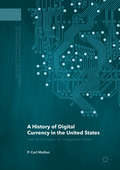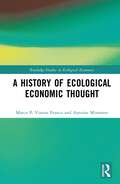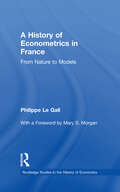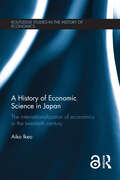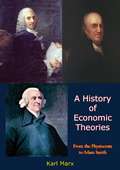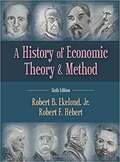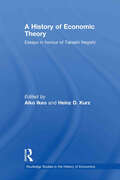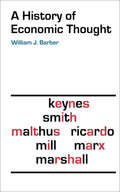- Table View
- List View
A History of British Actuarial Thought
by Craig TurnbullIn the first book of its kind, Turnbull traces the development and implementation of actuarial ideas, from the conception of Equitable Life in the mid-18th century to the start of the 21st century. This book analyses the historical development of British actuarial thought in each of its three main practice areas of life assurance, pensions and general insurance. It discusses how new actuarial approaches were developed within each practice area, and how these emerging ideas interacted with each other and were often driven by common external factors such as shocks in the economic environment, new intellectual ideas from academia and developments in technology.A broad range of historically important actuarial topics are discussed such as the development of the blueprint for the actuarial management of with-profit business; historical developments in mortality modelling methods; changes in actuarial thinking on investment strategy for life and pensions business; changing perspectives on the objectives and methods for funding Defined Benefit pensions; the application of risk theory in general insurance reserving; the adoption of risk-based reserving and the Guaranteed Annuity Option crisis at the end of the 20th century.This book also provides an historical overview of some of the most important external contributions to actuarial thinking: in particular, the first century or so of modern thinking on probability and statistics, starting in the 1650s with Pascal and Fermat; and the developments in the field of financial economics over the third quarter of the twentieth century. This book identifies where historical actuarial thought heuristically anticipated some of the fundamental ideas of modern finance, and the challenges that the profession wrestled with in reconciling these ideas with traditional actuarial methods. Actuaries have played a profoundly influential role in the management of the United Kingdom’s most important long-term financial institutions over the last two hundred years. This book will be the first to chart the influence of the actuarial profession to modern day. It will prove a valuable resource for actuaries, actuarial trainees and students of actuarial science. It will also be of interest to academics and professionals in related financial fields such as accountants, statisticians, economists and investment managers.
A History of British Livestock Husbandry, 1700-1900
by Robert Trow-SmithFirst Published in 2005. Routledge is an imprint of Taylor & Francis, an informa company.
A History of British Livestock Husbandry, to 1700
by Robert Trow-SmithFirst Published in 2005. Routledge is an imprint of Taylor & Francis, an informa company.
A History of Burley Tobacco in East Tennessee & Western North Carolina
by Billy YearginBurley tobacco revolutionized the industry in east Tennessee and western North Carolina. What started from two farmers planting white burley in Greeneville ignited an agricultural revolution and significantly changed crops, production and quality. Burley transformed the tobacco industry with new cultivation techniques and a shift from dark and flue-cured tobacco. By the 1990s, burley tobacco production in the region had drastically declined, and it is a tradition that few local farmers still practice. Agricultural experts Billy Yeargin and Christopher Bickers take a nostalgic look at the historic rise of burley tobacco and its gradual decline.
A History of Business Cartels: International Politics, National Policies and Anti-Competitive Behaviour (Routledge International Studies in Business History)
by Martin ShanahanInternational cartels are powerful organizations that impact our everyday lives, although they are little known. This book presents 15 historical case studies of international cartels that include agricultural and mineral commodities, the machinery industry, telephone equipment, whiskey and cement. These cases reveal that international cartels manipulated prices and shared markets over many decades but that their real impact was far wider. The global convergence towards criminalizing serious cartel conduct has seen a revival in historical research on cartels and competition policy. The regulation of anti-competitive behaviour has changed over time. To understand why the US, European and other modern economies altered their policies through the 20th century, it is critical to understand when, how and why governments have interacted with, and been influenced by, business organizations such as cartels. This volume draws together researchers from different nations to examine the impact of international cartels on the experience of individual nations, those nations’ interactions with one or more international cartels, and ultimately the interactions of individual nations with the wider international community. This book will be of interest to researchers, academics and advanced students in the fields of business and economic history, political economy, and government policy, as well as those interested in cartels and their impact on the wider economy.
A History of Canadian Accounting Thought and Practice (Routledge Library Editions: Accounting History #27)
by George J. MurphyThis book, first published in 1993, focuses on the evolution of accounting institutions, practices and standard-setting in Canada. Canada’s federal system complicates the jurisdictional authority for accounting matters. The Canadian constitution empowers the ten provinces to regulate the training and certification of accountants, and each can incorporate organizations. A great deal of effort has been made by accounting bodies on jurisdictional coordination and disputes, and this book analyses how these systems have come to function in their present form.
A History of Canadian Economic Thought (The\routledge History Of Economic Thought Ser.)
by Robin NeillIn A History of Canadian Economic Thought, Robin Neill relates the evolution of economic theory in Canada to the particular geographical and political features of the country. Whilst there were distinctively Canadian economic discourses in nineteenth-century Ontario and early twentieth-century Quebec, Neill argues that these have now been absorbed
A History of Capitalist Transformation: A Critique of Liberal-Capitalist Reforms (Routledge Frontiers of Political Economy)
by Giampaolo ConteA History of Capitalist Transformation: A Critique of Liberal-Capitalist Reforms highlights how, since the recent financial crises, the expression ‘liberal reform’ has entered common parlance as an evocative image of austerity and economic malaise, especially for the working classes and a segment of the middle class. But what exactly does ‘liberal reform’ refer to? The research analyzes the historical origins of liberal-capitalist reformism using a critical approach, starting with the origins of the Industrial Revolution.The book demonstrates that the chief purpose of such reforms was to integrate semi-peripheral states into the capitalist world-economy by imposing, both directly and indirectly, the adoption of rules, institutions, attitudes, and procedures amenable to economic and political interests of capitalist élites and hegemonic states – Britain first, the United States later – between the nineteenth and twenty-first centuries. As such, the reforms became an active tool used to promote social-economical-financial institutions, norms, and lifestyles typical of a liberal-capitalist economic order which locates some of its founding values in capital accumulation, profit-seeking, and social transformation.This book will be of significant interest to readers on capitalism, political economy, the history of the global economy, and British history.
A History of Cast Iron in Architecture (John Gloag On Industrial Design Ser.)
by John Gloag Derek BridgwaterOriginally published in 1948, A History of Cast Iron in Architecture is a comprehensive history of the part that has been played by cast iron in architecture and the allied arts in Britain. Any history of the rise and development of the iron-founding industry becomes virtually a history of the First Industrial Revolution. Examining the use of cast iron by builders and architects from late medieval times to the middle of the 20th Century the authors have also recorded a miniature history of British Industry. The introduction throws light on the early developments of iron-founding. The main sections of the book describe the rise and expansion of the cast-iron industry and its gradually increasing significance in architecture from 1650 to 1945. There are over 500 illustrations.
A History of Cold War Industrialisation: Finnish Shipbuilding between East and West (Perspectives in Economic and Social History)
by Saara MatalaThis monograph explores the economic consequences of the Cold War, a polarised world order which politicised technology and shaped industrial development. It provides a detailed archival-based history of the Finnish shipbuilding industry (1952–1996), which f lourished, thanks to the special relationship between Finland and the Soviet Union. Overall, it shows how a small country, Finland, gained power during the Cold War through international economic and technological cooperation. The work places Finland in a firmly international context and assesses the state–industry relationship from five different angles: technopolitics, trade infrastructure, techno-scientific cooperation, industrial reorganisation, and state aid. It presents a novel way to analyse industrialisation as an interaction between institutional stabilisation and f luctuation within a techno-economic system. In so doing, it makes empirical, theoretical, and methodological contributions to the history of industrial change. A History of Cold War Industrialisation will be of interest to advanced students and scholars in economic history, maritime history, Cold War history, and international political economy.
A History of Colombian Economic Thought: The Economic Ideas that Built Modern Colombia (The Routledge History of Economic Thought)
by Andrés Álvarez Jimena HurtadoEver since the quest for independence between 1810 and 1819, economic thought in Colombia has been shaped by policy debates and characterized by a pragmatic and eclectic approach. Economic thought in Colombia can only be revealed through the exploration of economists’ practices and the role of economic arguments within broader public debate. This history of Colombian economic thought provides a detailed account of major issues that have marked the constant feedback between economic ideas and economic practice in Colombia during the 19th and 20th centuries. This volume is thus a history of the interaction between ideas and policy. Those involved in these debates – politicians, public officials, journalists, and, latterly, professional economists – established direct contact with what can be identified as the centers of production of economic theory (both in Europe and the US) and entered regional and local networks in economics, but were not just importers of ideas or theories. The way in which they read, discussed, transformed and applied economic theories in Colombia makes for a rich environment for the production and implementation of economic policies that drew, diverged and transformed the way economics was understood and used as a source of knowledge for practical concerns. This is why the history of Colombian economic thought does not fit into traditional typologies of economic schools and why it must be understood as part of a political debate and within a political, social and cultural context that demanded specific solutions to urgent social demands. Through the study of what was taught, when and how, at the beginnings of the republican era, and why and how professional economists came to lead public debate and economic policy making in the 20th century, this book explores the foundations of this permanent interaction between theory and practice. This book will be of significant interest to readers of history of economic thought, economic history and the history of Colombian and Latin American economic, political and social life more broadly.
A History of Connecticut Wine: Vineyard in Your Backyard (American Palate)
by Eric D. Lehman Amy NawrockiWine has been meticulously crafted in Connecticut ever since colonists discovered wild grapes growing on their land. At first glance the New England climate appears inhospitable for this fastidious fruit but a number of varieties thrive here, including pinot gris, chardonnay, cabernet franc, cayuga white and st. croix. These carefully cultivated grapes have produced wines of unique characteristics and surprising quality. Join local wine enthusiasts Eric D. Lehman and Amy Nawrocki as they explore the intricacies of the region's local blends, the vintners that craft them, and the people who taste them. With vineyards and wineries in every corner of the state you're likely to find one that suits your palate in your backyard
A History of Corporate Financial Reporting in Britain (Routledge Studies in Accounting)
by John Richard EdwardsA History of Corporate Financial Reporting provides an understanding of the procedures and practices which constitute corporate financial reporting in Britain, at different points of time, and how and why those practices changed and became what they are now. Its particular focus is the external financial reporting practices of joint stock companies. This is worth knowing about given the widely held view that Britain (i) pioneered modern financial reporting, and (ii) played a primary role in the development of both capital markets and professional accountancy. The book makes use of a principal and agent framework to study accounting’s past, but one where the failure of managers always to supply the information that users’ desire is given full recognition. It is shown that corporate financial reporting did not develop into its current state in a straightforward and orderly fashion. Each era produces different environmental conditions and imposes new demands on accounting. A proper understanding of accounting developments therefore requires a careful examination of the interrelationship between accountants and accounting techniques on the one hand and, on the other, the social and economic context within which changes took place. The book’s corporate coverage starts with the legendary East India Company, created in 1600, and continues through the heyday of the statutory trading companies founded to build Britain’s canals (commencing in the 1770s) and railways (commencing c.1829) to focus, principally, on the limited liability company fashioned by the Joint Stock Companies Act 1844 and the Limited Liability Act 1855. The story terminates in 2005 when listed companies were required to prepare their consolidated accounts in accordance with International Financial Reporting Standards, thus signalling the effective end of British accounting.
A History of Credit and Power in the Western World
by Scott B. MacDonaldThe end of the Cold War put the planet on a new track, abruptly replacing the familiar world of bipolarity, red phones, and intercontinental ballistic missiles with the strange new world of the Internet, e-commerce, and Palm Pilots. The "New World Order" was defined by a U.S.-led war against Iraq, bloody ethnic strife in Bosnia and Rwanda, and religious turmoil in Central Asia. This evolving global system, however, overlooked the powerful role of credit, which functions as a critical building block for developing greater national and individual wealth. This volume examines the evolution of credit in the Western world and its relationship to power. Spanning several centuries of human endeavor. it focuses on Western Europe and the United States and also considers how the Western system became the global credit system. Six major themes run throughout: (1) the direct relationship between credit and power; (2) different kinds of political power promote different kinds of economic behavior; (3) various societal and cultural groups were often more successful in mingling credit and political power; (4) the Western credit system evolved in tandem with the development of the nation-state; (5) historically, there has been a pattern of financial crises; (6) credit spread from being the privilege of the wealthy and powerful to being available to vast numbers. MacDonald and Gastmann have broken history into five periods, ranging from early pre-modern, defining the earliest references to banking and credit as exemplified by the Code of Hammurabi, circa 1726 BC, through the Roman Empire with its creation of money and growing use of credit in trade, the barbarian invasions of the 11th century which led to a breakdown in credit networks in the West, through the establishment of the Italian city-states, to the modern period which incorporates the rise of credit in the Low Countries in the 1500s and extends through the rise of London and New York as the major international credit hubs.
A History of Czech Economic Thought (The Routledge History of Economic Thought)
by Antonie DoležalováSituated in the turbulent heart of Europe, the Czech Republic has suffered from significant discontinuity in its historical development, but its economic thinking has not until now been subject to a full analysis. This book offers a history of Czech economic thought from the late Middle Ages to the present day. It traces methodological developments and the relationship between economics and politics, and introduces not just pioneering figures in the field but also those whose lives and careers were thwarted by history, as well as Czech exile thinkers. Identifying key themes in Czech economic thought, the volume considers which branches of economic theory have had the greatest influence on Czech thought, and explores the relationship between Czech economic thinking and wider established schools of thought. This book will benefit students and researchers of history of economic thought, economic history, economic theory, and political economy, as well as those with a specific interest in the Czech Republic.
A History of Development Economics Thought: Challenges and Counter-challenges (Routledge Studies in Development Economics #109)
by Shahrukh Rafi KhanThis book explores the history of economic development thought, with an emphasis on alternative approaches in macro development economics. Given that the pioneers of development economics in the 1940s and 1950s drew inspiration from classical political economists, this book opens with a review of key classical scholars who wrote about the progress of the wealth of nations. In reviewing the thinking of the pioneers and those that followed, both their theories of development and underdevelopment are discussed. Overall, the book charts the evolution of development economic thought from the early developmentalists and structuralists, through to the neo-Marxist approach and radical development theory, the neo-liberal counter revolution, and the debate between new developmentalists and neo-liberal scholars. It ends with an assessment of the state of the field today. This book will be of interest to all scholars and students interested in the evolution of development economics.
A History of Digital Currency in the United States: New Technology in an Unregulated Market (Palgrave Advances in the Economics of Innovation and Technology)
by P. Carl MullanThis book presents detailed case studies of the first commercial internet digital currency systems developed between 1996 and 2004. Transactions completed with the new technology circumvented all US financial regulations, an opening that transnational criminals exploited. Mullan explains how an entire industry of companies, agents, and participants turned a blind eye to crimes being committed in this unsupervised environment. He then tracks the subsequent changes made to US regulations that now prevent such unlicensed activity, illustrating the importance of supervising products and industries that arise from new disruptive technology. This book distills hundreds of hours of interviews with the creators and operators of early digital currency businesses to create detailed case studies of their practices.
A History of Ecological Economic Thought (Routledge Studies in Ecological Economics)
by Marco P. Vianna Franco Antoine MissemerContributing to a better understanding of contemporary issues of environmental sustainability from a historical perspective, this book provides a cohesive and cogent account of the history of ecological economic thought. The work unearths a diverse set of ideas within a Western and Slavic context, from the Renaissance and the Enlightenment to the late 1940s, to reveal insights firmly grounded in historiographical research and of import for addressing current sustainability challenges, not least by means of improving our grasp on how humans and nature can generously coexist in the long term. The history of ecological economic thought offered in this volume is rich and diverse, encompassing views that are bound by the observance of the tenets of the natural sciences, but which differ significantly in terms of the role of energy and materials to cultural development and the normative aspects involving resource distribution, social ideals, and policy-making. Combining the approaches of independent scholarly figures and scientific communities from different historical periods and nationalities, the book brings elements that are still missing in the scarce literature on the history of ecological economic thought and highlights the underlying threads which unite such initiatives. The book brings a fresh look into the historical development of ecological economic ideas and will therefore be of great interest to scholars and students of ecological economics, environmental economics, sustainability science, interdisciplinary studies, and history of economic thought.
A History of Econometrics in France: From Nature to Models (Routledge Studies In The History Of Economics Ser.)
by Philippe Le GallThis text challenges the traditional view of the history of econometrics and provides a more complete story. In doing so, the book sheds light on the hitherto under-researched contribution of French thinkers to econometrics. Fascinating and authoritative, it is a comprehensive overview of what went on to be one of the defining subsets within t
A History of Economic Science in Japan: The Internationalization of Economics in the Twentieth Century (Routledge Studies in the History of Economics)
by Aiko IkeoJapanese economists began publishing scientific papers in renowned journals including Econometrica in the 1950s and had made their significant contributions to the sophistication of general equilibrium analysis by intensive use of a variety of mathematical instruments. They had contributed significantly to the transformation of neoclassical economics. This book examines how it became possible for Japanese economists to do so by shedding light on the "professional" discussion of the international gold standard and parity policies in the early twentieth century, the acceptance of "mathematical economics" in the following period, the impact of establishment of the Econometric Society (1930), and the swift distribution of theory-oriented economics journals since 1930. This book also includes topics on the historical research of the Japanese foundations of modern economics, the transformation of the economics of Keynes into Keynesian economics, Japanese developments in econometrics, and Martin Bronfenbrenner's visit to Japan in the post-WWII period. This book provides insight into the economic research done by Japanese scholars in the international context. It traces how, during the period 1900-1960, economics was harmonized with economics and a standard economics was re-shaped on the basis of mathematics thanks to economists' appetite for rigor and will help to contribute to existing literature.
A History of Economic Science in Japan: The Internationalization of Economics in the Twentieth Century (Routledge Studies in the History of Economics)
by Aiko IkeoJapanese economists began publishing scientific papers in renowned journals including Econometrica in the 1950s and had made their significant contributions to the sophistication of general equilibrium analysis by intensive use of a variety of mathematical instruments. They had contributed significantly to the transformation of neoclassical economics. This book examines how it became possible for Japanese economists to do so by shedding light on the "professional" discussion of the international gold standard and parity policies in the early twentieth century, the acceptance of "mathematical economics" in the following period, the impact of establishment of the Econometric Society (1930), and the swift distribution of theory-oriented economics journals since 1930.This book also includes topics on the historical research of the Japanese foundations of modern economics, the transformation of the economics of Keynes into Keynesian economics, Japanese developments in econometrics, and Martin Bronfenbrenner's visit to Japan in the post-WWII period.This book provides insight into the economic research done by Japanese scholars in the international context. It traces how, during the period 1900-1960, economics was harmonized with economics and a standard economics was re-shaped on the basis of mathematics thanks to economists' appetite for rigor and will help to contribute to existing literature.
A History of Economic Theories: From the Physiocrats to Adam Smith
by Karl MarxKarl Marx’s History of Economic Theories from the Physiocrats to Adam Smith is Part I of the legendary but previously untranslated Volume IV of Marx’s Capital. Although it was written some ninety years ago, it remained unpublished until the first German edition appeared in 1904. Originally, Marx had intended to prepare the first three volumes for publication, then, from the remaining mass of manuscript, to extract a final volume constituting a history of theories of surplus value. Engels, who became Marx’s literary executor, was unable to follow this plan during his lifetime and assigned the task to Kautsky. Kautsky, however, found it impossible to carry out the project in the form intended. Much of the material indicated by Marx and Engels for inclusion in Volume IV had already been covered, in part at least, in the three preceding volumes. Consequently, the work as it now stands does not follow Marx’s precise plan. It is more comprehensive in scope, deals with economic theories whose relation to surplus value and profit is not immediate, and more closely approaches a complete and critical history of economic theories than the narrower concept which Marx had had in mind.
A History of Economic Theory and Method
by Robert B. Ekelund Robert F. HébertKnown for its clarity, comprehensiveness, and balance, the latest edition of A History of Economic Theory and Method continues that tradition of excellence. <p><p>Ekelund and Hébert's survey provides historical and international contexts for how economic models have served social needs throughout the centuries beginning with the ancient Greeks through the present time. The authors not only trace ideas that have persisted but skillfully demonstrate that past, discredited ideas also have a way of spawning critical thinking and encouraging new directions in economic analysis. <p><p>Coverage that distinguishes the Sixth Edition from its predecessors includes a detailed analysis of economic solutions by John Stuart Mill and Edwin Chadwick to problems raised by the Industrial Revolution; the role of psychology and "experiments" in understanding demand and consumer behavior; discussions of modern economic theory as it interrelates with other social sciences; and a close look at the historical development of the critical role of entrepreneurship, both in its productive and unproductive variants. <p><p> The authors' creative approach gives readers a feel for the thought processes of the great minds in economics and underscores key ideas impacting contemporary thought and practice. Well-crafted discussions are further enriched by absorbing examples and figures. Thorough suggested reading lists give options for more in-depth explorations by interested readers.
A History of Economic Theory: Essays in honour of Takashi Negishi (Routledge Studies in the History of Economics)
by Heinz D. Kurz Aiko IkeoFew economists have been as prolific and wide-ranging as Takashi Negishi. Part of the "Hicksian" generation of Neo-Walrasian general equilibrium theorists, Negishi rose to prominence during the early 1960s with his work on the Neo-Walrasian system. Negishi's signature has been his attempt to extend the multi-market Neo-Walrasian system in several directions to incorporate concerns such as imperfect comptetition, stability, money, trade and unemployment - and, as a consequence, helping to discover and delineate the limits of conventional theory. This collection in honour of Takashi Negishi analyses his contributions to the history of economic theory. Economists paying tribute within this volume include Neri Salvadori, Laurence Moss, and Joaquim Silvestre.
A History of Economic Thought (Blackwell Companions To Contemporary Economics Ser.)
by William J. BarberThis critical study of the development of systematic economic ideas explores them in both historical and contemporary contexts. Many of the issues that faced economists in the past are still with us. The theories and methods of such men as Adam Smith, T. R. Malthus, David Ricardo, J.S. Mill, Karl Marx, Alfred Marshall, and J. M. Keynes are often relevant to us today. As the Great Recession taught us in the first decade of the twenty-first century, the history of economic thought can have wide-ranging practical applications. In this volume, Professor William J. Barber assesses the thought of a number of important economists both in terms of the issues of their day and in relation to modern economic thought. By concentrating on the greatest exponents, he highlights the central properties of the four main schools of economic thought—classical, Marxian, neo-classical, and Keynesian—and shows that although each of these traditions is rooted in a different stage of economic development, they can all provide insights into the recurring problems of modern economics.
